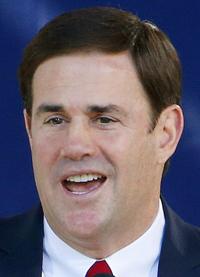PHOENIX — A plan to tap the state’s land trust account is forming the basis for a deal set for legislative debate this week to finally end a 2010 lawsuit over adequacy of state education funding.
The package, negotiated this past week behind closed doors, will rely heavily on the fact that there is close to $5 billion in the account designated for K-12 education.
That fact became the focal point of a June proposal by Gov. Doug Ducey to use those dollars to put new money into schools, regardless of the outcome of the litigation.
It ran into its own problems amid questions of whether the huge withdrawals he was proposing — about $325 million a year to start — would ultimately damage the account.
Since that time, though, court-overseen negotiations to settle the lawsuit broke down.
That provided a new opportunity to come up with a comprehensive package combining readily available trust dollars with other sources of revenue — all without a tax hike.
And there are other dollars available.
Arizona ended the last fiscal year on July 31 with $322 million more than anticipated. There is also about $460 million in the “rainy-day” fund.
The key now is selling the deal — negotiated among the governor, Republican legislative leadership and the education community — to the rank and file. Senators will start getting briefings Monday, Oct. 26, with House Speaker David Gowan proposing to chat with his own GOP caucus on Tuesday and Wednesday. Gowan said Sunday he would not predict whether he can line up the votes.
“We’ve got some issues I’ve got to talk to the caucus about,” he said.
One of those is going to be selling the package to skeptics.
That includes Rep. Sonny Borrelli, R-Lake Havasu City.
He told Capitol Media Services on Sunday that he wants to see the details of what the state is offering — and what guarantees there are the money will be well-spent.
“What checks and balances are there?” he asked. “We want to be sure the money goes into the classroom, not into bloated administrative bureaucracies. The taxpayers are demanding the same thing.”
And some lawmakers also point out that charter schools — public schools run by private entities — get less money per student than traditional public schools.
But the issue is even more complex than that. It will require convincing legislators that not settling the case now creates an even bigger financial risk.
Gowan, in his message to Republican lawmakers, told them he will be bringing along the attorneys who have been defending the state in court to explain the situation.
That 2010 lawsuit is based on a 2000 voter-approved law, which hiked the state’s 5 percent sales tax by six-tenths of a cent. The same law requires the state to adjust aid to schools annually for inflation, up to 2 percent a year, but that ended after 2009.
For the moment, the Democrats, who are in the minority in both chambers, have been left in the dark.
House Minority Leader Eric Meyer acknowledged the fact that there is a deal means that the Arizona School Boards Association, which has taken the lead in the lawsuit on behalf of the approximately 1.1 million students in public schools, apparently is satisfied.
However, he said that does not necessarily translate into Democrats going blindly along.
“I’ve heard from multiple people this is a good deal,” said Meyer, D-Paradise Valley. “But until I see it, I’m not convinced.”
And Meyer said Democrats continue to believe there is enough cash in the state coffers to settle the lawsuit, all without digging deeper into the trust account.
That goes to the other key unknown: voter support.
A current constitutional provision caps what can be taken out of the trust account at about $100 million a year. Any increase to that would have to go to the ballot.




